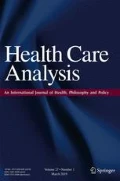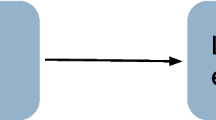Abstract
Despite the increasing focus on rationing, and rationing decisions in the NHS, little attention has been given to patient's perceptions of rationing and the potential impact this might have on people's use of services. Drawing on the qualitative findings of a study conducted in the North West of England which was concerned with the pattern and processes of primary care help seeking, this paper sets out to examine perceptions and experiences of rationing in primary care and the potential impact this has on people's use of services. In relation to primary care services people had experienced rationing by deterrence, dilution and delay. There was some evidence that perceptions of rationing impacted on help seeking and the use of primary care services. The implications for understanding the way in which perceptions of rationing might influence the formulation of demand and help seeking by people using primary care services are discussed.
Similar content being viewed by others
References
Bowling A. (1993) What People Say About Prioritising Services. London: King's Fund Centre.
Coote, A. and Lenaghan, J. (1997) Citizens Juries: Theory into Practice. London: Institute for Public Policy Research.
Entwistle, V., Watt, I. S., Bradbury, R. and Pehl, L. J. (1996) Media Coverage of the Child B Case. British Medical Journal 312, 1587–1591.
Ham, C. (1996) Health Care Rationing. British Medical Journal 310, 1438–1439.
Harrison, S. (1995) A Policy Agenda for Health Care Rationing. British Medical Bulletin 51, 885–889.
Hunter, D. (1995) Rationing Health Care - the Political Perspective. British Medical Bulletin 51, 876–884.
Kennelly, C. and Dale, J. (1998) Direct Enquiries Health Service Journal 108, 5615 24.
Klein, R. (1993) Dimensions of Rationing: Who Should Do What? British Medical Journal 307, 309–311.
Klein, R., Day, P. and Redmayne, S. (1996) Managing Scarcity: Priority Setting and Rationing in the National Health Service. Buckingham: Open University Press.
Kneeshaw, J. (1997) What Does the Public Think About Rationing? A Review of the Evidence. In B. New (Ed.), Rationing: Talk and Action in Health Care. London: King's Fund and BMJ Publishing Group.
Lomas, J. (1997) Reluctant Rationers: Public Input into Health Care Priorities. Journal of Health Services Research and Policy 2, 103–121.
Maxwell, R. J. (1995) Rationing Health Care. British Medical Bulletin 51, 761–768.
Morrissey, J. (1997) Managed Care on Call. Modern Health Care (25 August), 50–53.
New, B. (On behalf of the Rationing Agenda Group (RAG)) (1996) The Rationing Agenda in the NHS. London: Kings Fund Publishing.
Ovretveit, J. (1997) Managing the Gap Between Demand and Publicly Affordable Health Care in an Ethical Way. European Journal of Public Health 7(2), 128–135.
Pickard, S. (1998) Citizenship and Consumerism in Health Care: A Critique of Citizens' Juries. Social Policy and Administration 32(3), 226–245.
Rogers, A., Hassell, K. and Nicolaas, G. (1998a) Demanding Patients? Analysing the Use of Primary Care. Buckingham: Open University Press.
Rogers, A. Entwistle, V. and Pencheon, D. (1998b) A Patient-Led NHS: Managing Demand at the Interface between Lay and Primary Care. British Medical Journal 316, 1816–1819.
Silverman, D. (1994) Interpreting Qualitative Data. London: Sage.
Stewart, M., Browne, B., Weston, W., McWhinney, I., McWilliam, C. and Freeman, T. (1995) Patient-Centred Medicine Transforming the Clinical Method. London: Sage.
Strauss, A. and Corbin, J. (1990) Basics of Qualitative Research. Grounded Theory, procedures and techniques. London: Sage.
Telles, B. and Pollack, M. (1981) Felling Sick: The Experience and Legitimation of Illness. Social Science and Medicine 15(9), 243–251.
Williams, R. (1983) Concepts of Health: An Analysis of Lay Logic. Sociology 17(2), 210–221.
Author information
Authors and Affiliations
Corresponding author
Rights and permissions
About this article
Cite this article
Rogers, A., Chapple, A. & Sergison, M. 'If a Patient is Too Costly They Tend to Get Rid of You:' The Impact of People's Perceptions of Rationing on the Use of Primary Care. Health Care Analysis 7, 225–237 (1999). https://doi.org/10.1023/A:1009409111428
Issue Date:
DOI: https://doi.org/10.1023/A:1009409111428




